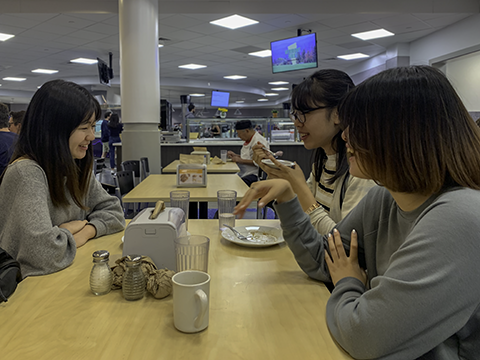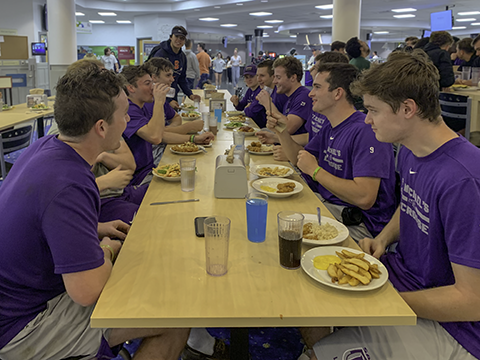
By Emma Shortall
Multimedia Editor
Our generation is obsessed with the idea of traveling. Right from the start, we post pictures of ourselves on flights, post countless photos of the vacation, and when we leave we post a goodbye post. But in life, in general, we completely ignore the international connections that we could make, and leave the walls up.
The summer before my first-year I was like anyone else, scared but excited for a change. When I read the name of my roommate, Carol, the first thing I noticed was that she has three last names, I instantly assumed she was Spanish. On further investigation, or should I say social media stalking, I found out she was from Brazil. That instantly accentuated my anxiety. I never had any friends from another country and I worried that our cultures would clash.
“For American students, it’s not cool to hang out with international students.”
Haobo Wang, ’19, MA TESOL student
But I was wrong, and we instantly hit it off. We watched the same childhood shows, we both had loved One Direction and loved to have spontaneous dance parties. Our different nationalities were simply just another part of us.
Slowly I began finding my place at school, finding out who my friends were, and they included American students, but they also included international students, like my roommate. I started branching out and meeting more and more people from all over the globe: Bingyi, from Shanghai, Sangjun, from South Korea, and many others. But it was pretty clear pretty soon that this wasn’t the norm. Even with the 113 international students living on campus, it’s rare to see American students mingling with them.
In the state of the world today, people tend to see their differences instead of similarities, whether it be the color of their skin, how they dress or their nationality. As American students, we typically see us as the norm and anyone from elsewhere as “different.” We assume everyone who wears a headdress is Muslim and everyone who is Asian is Chinese. We stereotype people because it’s easier to package them.
If we break down the stereotypes and get to know each other we’d see we are all the same. We all have our different journeys to St. Michael’s whether it be a less than an hour drive to an almost 20-hour plane ride. We are all here for the same reason, to learn.

“For American students, it’s not cool to hang out with international students,” said Haobo Wang, an MA TESOL student who graduated from St. Michael’s in May. He believes that St. Michael’s American students simply don’t put in enough effort to meet these students. “International students want to make friends with American students, but sometimes they don’t know how to,” Wang said.
We have students from 29 countries, from Europe, Asia, South America, Africa, and the Middle East. They come here for as little as a semester, or until they graduate but the boundaries on campus are sometimes larger than those that separate countries.
We need to cross these boundaries that we built, we need to mingle, we need to burst this comfortable bubble we live in. We have so many outlets at this school to immerse yourself in all of these cultures.
Here’s how we can do it. Every week there is International Coffee Hour, in St. Edmund’s lobby, for both international and American students to mingle. But every week I see almost no American students attend. This is a great way to interact with students from all over the world in a very informal situation. Start a conversation.
The school has a Global Experience Academic Residential Program, GEAR, where American students can live with international and other American students. It’s the best of both worlds. So why don’t more students jump at this chance? I learned more Japanese words than I ever thought I would, from “Oyasumi” to “Kurutta” and made one of my best friends Sayaka from GEAR. We went on many adventures together, from our Montréal trip to smaller things such as teaching her how to ice skate.
This year the International Festival falls on November 16. There are tons of different international cultures, food, and people being represented during this event. This year I’ll even be performing for a country I’ve never even been to, Korea and learning different songs and dances with my friends.
I’ve learned more about the state of the world, and the state of these other countries just by having conversations with international students. Did you know that some Japanese put a towel over their pillow when they sleep because “it’s dirty”? What about how kids at Easter in Brazil get toys inside a big chocolate egg? Or that garbage trucks in Taiwan play music?
If you think you’re a global citizen, and that the border wall is a problem, start at home to make changes. Instead of building up these walls, we should be tearing them down.

